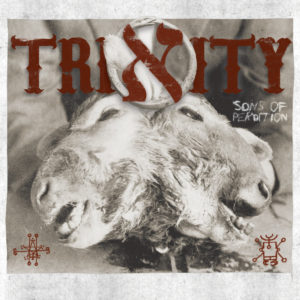Without a dime or a bite of food, desperation turned to panic,
so when a hunter found my den, he found a beast that had gone manic.
I brained him with my rifle butt, then took my knife and slit.
I dressed his body where it lay, then roasted it upon a spit.
Sons Of Perdition –“Profane The Night”
Trinity (Grave Wax Records) is the third release from Sons of Perdition, the work of singer/songwriter/multi-instrumentalist Zebulon Whatley, along with various guest musicians. Previous albums include The Kingdom Is On Fire (2007) and Psalms For The Spiritually Dead (2010). Together the three albums create what the act refers to as the ‘Dissolution Trilogy’.
Trinity can loosely be described as dark country, created on traditional instruments such as acoustic and steel guitars, double bass, piano, ukulele and violin and viola. The cover artwork seems somewhat occult-influenced and would not be out of place on a death metal album, with mysterious symbols and a two-headed goat.
Trinity tells the story of a drifter in the American Southwest, presumably in the early 1900’s, whose life leads on a downward trajectory, beginning when he decides to rob a church with his partner. He is condemned to a life in prison but manages a chance escape, only to endure a poisonous snakebite and a search for the cure, leading finally to madness and death.
The blook-soaked lyrics are the musical equivalent of a Quentin Tarantino film, full of gunflights, ultraviolence and wry wit, set against the romantic setting of the Wild West, in a simpler time before timecards, television and computers. Some of the more graphic imagery could even be reminiscent of Italian horror, such as the works of Lucio Fulci or Dario Argento–full of maggots, brains, blood and bone.
Sons of Perdition have been described using many different terms, and they are all correct in their own way. Some writers have used the simple, yet apt, terms “goth country” or “death country”. More recently, the act seems to be described as “roots music”, an umbrella term that can refer to anything from Americana to alt-country to folk to bluegrass to blues rock to many other descriptors. Other writers tend to draw a more direct parallel to early country/folk music.
I’m not qualified to put Sons of Perdition any of the above categories, as I’m largely unfamiliar with these genres of music. Immediately however, I am reminded of Nick Cave & The Bad Seeds seminal album Murder Ballads (1996), which created the unlikely hit “Where The Wild Roses Grow” a duet with Kylie Minogue about love and murder.
At times I am reminded of another Australian, Jim Thirlwell of Foetus, who also explored the darker themes of life. Foetus also famously defied description, his music covering everything from industrial to big band, from rock to classical, from pop to experimental. Along the same lines, Sons of Perdition have created their own unique sound that refuses to be categorized.
I highly recommend Trinity for all fans of dark music, especially for those who may enjoy traditional country and folk music. I could see fans of neo-folk bands such as Death In June or Current 93 enjoying this especially. Trinity offers beauty in its performances and production, along with thought-provoking and disturbing imagery in its lyrics and presentation. This album will sit with you if you let it, a dark companion and a welcome escape from the drudgery of 21st century life.
Give a listen below from the Sons Of Perdition bandcamp page.
Where to buy: Trinity can be purchased directly from the band at their official website, their bandcamp page or through other online retailers including Amazon and iTunes.
ErikTomrenWrites is a participant in the Amazon Services LLC Associates Program, an affiliate advertising program. Your purchases on Amazon.com via our links will help support ErikTomrenWrites – at no extra cost to you!

Pingback: Early Music Guild of Seattle: "The Winds of Time" - #ErikTomrenWrites
Pingback: 2013 – A Writer’s Year in Review - #ErikTomrenWrites